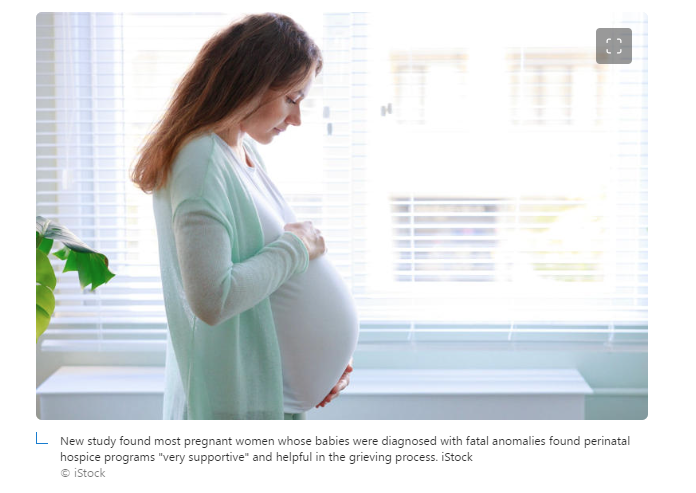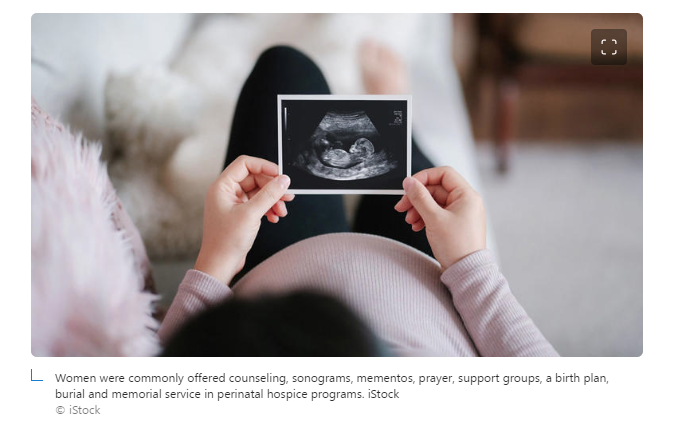
New study finds women who choose supportive birth services over abortion benefit in tragic fetal anomaly cases
By Kristine Parks, originally published March 17, 2024, Fox News, MSN
A new study analyzed the experiences of pregnant women who chose perinatal hospice care after their babies were diagnosed with life-limiting conditions, rather than seeking an abortion.
Overwhelmingly, the women found these services “very helpful” and expressed “a high degree of satisfaction with the care they received,” the report from Christian nonprofit The Family Research Council said.
The study comes at a time when pro-life states grapple with whether to allow abortion exceptions in cases of fatal fetal anomalies.
Additionally, stories of women seeking abortions for life-threatening fetal anomalies since the fall of Roe v. Wade have made national headlines.
PRO-LIFE STATES CONSIDER ABORTION EXCEPTIONS IN CASES OF FATAL FETAL ANOMALIES

The FRC study surveyed 82 women in 11 hospice programs to determine who was choosing perinatal hospice, what type of care they were receiving, and how they felt about their experience in these programs.
Most of the respondents were married, White, and religious. Most had above average incomes and bachelor’s degrees.
These women said they were commonly offered counseling, sonograms, mementos, prayer, support groups, a birth plan, burial and a memorial service. A large majority of the women reported high levels of satisfaction with the support they received and found the programs helpful for the grieving process.
“Overall, women expressed a high degree of satisfaction with the care they received from perinatal hospices with 83 percent of women reporting the level of emotional support from the perinatal hospice as ‘very supportive’ and 79 percent of women unable to note anything from the program that was not helpful in the grieving process,'” the FRC said in a media release.
NEW BOOK TEACHES CHILDREN THAT THOSE WITH DISABILITIES ARE ‘DIFFERENT BY DESIGN’ AND LOVED BY GOD

The vast majority of women who sought this care also reported a high level of confidence in their decision to carry to birth, with 86 percent reporting they were “very much” confident in this decision after receiving this care and none reporting they were “not at all confident.”
Despite the positive experiences these women had with these programs, most were advised to have an abortion when doctors informed them about their child’s diagnosis.
More than 55 percent of the women in the study reported being encouraged by a doctor to get an abortion with the majority relaying they were advised this option on more than one occasion. Just 19 percent of the women were also told about perinatal hospice at this recommendation.
“The results indicate that many healthcare professionals either do not know about perinatal hospice or are reluctant to recommend perinatal hospice services to pregnant women who receive adverse prenatal diagnoses,” the study’s authors said. “Furthermore, a strong majority of the women who obtained perinatal hospice care strongly approved of the counseling, emotional support, and other services that they received.”
The report hopes to highlight how perinatal hospice programs can provide a “life-affirming” option for pregnant women struggling with a fatal fetal diagnosis.
However, only 25 percent of the women in the study said that their insurance provided access to perinatal hospice care.
“Increasing the awareness of perinatal hospice among policymakers, healthcare professionals, and the general public is an important and worthwhile goal for the pro-life movement,” Dr. Michael New, an associate professor at the Catholic University of America who co-authored the report, said.
“It will give women who obtain adverse prenatal diagnosis more options and will hopefully result in a higher percentage of these women making the life-affirming choice of perinatal hospice for both themselves and their preborn child,” he continued.
Kristine Parks is an associate editor for Fox New Digital
